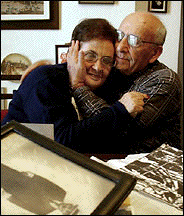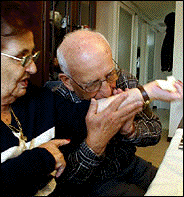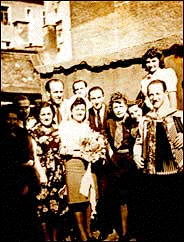December 23,
2003

A
Hanukkah Miracle
Apart for Decades,
Found in Their Own Backyard
By
RICHARD
BERNSTEIN
BNEI BRAK, Israel, Dec. 22 --
Call it the Hanukkah miracle, because it happened last
Friday on the first night of the Jewish Festival of
Lights. It happened as Beniamin Shilom was about to light
the traditional first candle and the phone
rang.
Somebody -- it was
Mr. Shilom's great-nephew, though he did not know he
had a great-nephew -- asked Mr. Shilom if his name
was Shlomowicz.
"No," Mr. Shilom replied, a bit
hastily, since Shlomowicz had been his name until he
changed it years ago when he came to Israel.
"Do you have a sister named
Rozia?" the caller persisted.
"Yes," said Mr. Shilom, and felt
a little shiver of anticipation, though his first thought
was a dark one. He feared that this unexpected caller was
going to tell him what he had long ago assumed -- that
his little sister, Rozia, whom he had last seen in 1937
when she was 6 or 7 and he was 10 or 11 (their memories
are a little hazy), had been murdered in the
Holocaust.

|
..
|
|
Rozia
November and her brother Beniamin Shilom each
believed that the other had died during World
War II. In fact, they had been living not far
apart in Israel for more than 50 years. They
were able to find each other through Yad Vashem,
the Israeli Holocaust Memorial in
Jerusalem.
|
"Would you like to talk to her?" Mr. Shilom's
great-nephew, Nir Silberberg, asked.
That was Friday. The next day,
for the first time in almost 67 years, Mr. Shilom, 77,
was reunited with Rozia November, née Shlomowicz,
73.
"Did you recognize her?" he was
asked.
"You know, she's not so young
anymore," Mr. Shilom said. It wasn't a joke. It was the
simple truth that you don't recognize somebody whom you
have not seen for almost 67 years, not even a sister
after she has become a grandmother. But, he continued, "I
looked into the depths of her eyes, and I was convinced
that it was her."
It was, and by now, pretty much
everybody in Israel knows the story of Bennie and Rozia,
the brother and the sister who, for what amounts to a
lifetime, thought that the other was dead. And not only
that. For almost half a century, both have been living
not far from each other in tiny Israel, a country where
there is rarely more than a degree or two of separation.
But it is only now, amazingly, that they have found each
other.
As the home of many Holocaust
survivors, of course, Israel is a place where almost
everybody has heard a story a bit like that of Mr.
Shilom's and Mrs. November's. The search for long lost
relatives has extended over decades and still goes
on.
But the very length of time that
Mr. Shilom and Mrs. November waited gives their tale a
special measure of poignancy. In addition, it turns out
that this particular brother and sister have lived lives
that touched on an extraordinary number of the iconic
events and people of the years of the war.
They were born in Warsaw, Mr.
Shilom in 1926, and Mrs. November four years later, to a
once prosperous Jewish family that had fallen on hard
times during the Depression. There were two other
brothers in the family, Shlamik and Savek.

|
..
|
|
Beniamin
Shilom kissed the Auschwitz tattoo of his
sister, Rozia November, when they were reunited
Saturday in Israel.
|
As Mr. Shilom tells the story, their father left Warsaw
when Mr. Shilom was just 7 years old, exactly why is not
clear. After awhile, their mother went away also, and the
children, left without anybody to take care of them, were
dispersed in several orphanages, run by Janusz Korczak,
the legendary doctor and educator who went to his death
at Treblinka with 200 children he had tried to harbor
during the war.
In the late 1930's, Beniamin was
sent to an institution in Pinsk, in what is now Belarus,
while Rozia stayed at a home in Warsaw. Once, Beniamin
went to Warsaw on a field trip organized by his school,
and he wanted to visit Rozia.
"I saw a beautiful girl carrying
a school bag, and I recognized her," he recalled. "
`Hello, I'm Bennie,' I said. `I'm your brother.' She got
up on her tiptoes and tried to kiss me, but I was
embarrassed and I didn't let her."
Mr. Shilom stopped for a
minute.
"That's the last time I saw
her," he resumed, "and now 67 years have passed, and for
67 years, it has pursued me that I didn't let my sister
kiss me."
Because Mr. Shilom was in the
Soviet Union when the war broke out he was able to become
a soldier in the Soviet Army. He fought on several
fronts, earning more than a dozen medals as commander of
an artillery unit and finishing the war in Berlin, with
the German defeat.
Rozia, who in Israel sometimes
goes by the name Shoshana, had a harder time of it. Her
father returned to Warsaw, divorced her mother and took
Rozia to live with him and a new wife in Krakow. When the
war came, her father was arrested (in 1947, Mr. Shilom
received a letter from the Red Cross informing him that
his father had been executed by the Germans in Warsaw).
Krakow was the city where Oskar Schindler undertook his
effort to save Jews, and Rozia met him, though she was
not taken into one of his factories. Instead, at the age
of 13, she was taken to Auschwitz.

|
..
|
|
Rozia
November, above others, met Oskar Schindler,
second from left, but did not work for
him.
|
"Mengele put me into the children's line," Mrs. November
said, referring to Josef Mengele, the doctor who was in
charge of selecting who would live and who would die at
Auschwitz.
"That was the line that went to
the gas chambers," Mrs. November said. "They gave me a
child to hold. There was an old woman and she told me
that I had to stay alive and tell everybody what
happened."
" 'But how can I get out of
here?' " Mrs. November said she remembers
asking.
" 'You have to,' " she recalled
the woman saying, before pushing Rozia into a group of
people not slated for immediate execution. She survived
six months at Auschwitz, then she survived the death
march, when the Gestapo evacuated the camps ahead of the
Soviet Army and forced the prisoners to walk west. She
ended up in a satellite of the Ravensbrück Camp, and
she survived that, too. In 1949, after three years as a
displaced person in Germany, she emigrated to
Israel.
As it happens, Mr. Shilom was
among the Soviet troops that liberated Auschwitz early in
1945. Mrs. November had already been evacuated, so she
would not have been there if he had thought to look for
her, which he did not. But it seems an eerie coincidence
to them now that they had both been at the heart of the
Nazi machinery of cruelty and death, and that in
different circumstances, one might have saved the
other.
Mrs. November married soon after
she came to Israel; her husband died 13 years ago. She
has two daughters. Mr. Shilom, who came to Israel in
1957, also married and has three sons, all of them now
officers in the Israeli Army. Neither has ever heard a
word about the fate of their two brothers and their
mother.
About four years ago, Mr. Shilom
visited Yad Vashem, the Israeli Holocaust Memorial in
Jerusalem, where he filled out forms giving information
on his missing relatives.
Mrs. November had been to Yad
Vashem several times to see if there was information
about her family members, but there never was. Then, on
Friday, a family friend from the United States who is
making a documentary film about her life, asked her to go
to Yad Vashem again.
"It was cold. It was raining. I
didn't want to go," Mrs. November recalled. But she did
go and, this time, a solicitous member of the staff
wanted to do some research on her.
"I have nobody," protested Mrs.
November, who had last seen a member of her family when
the Gestapo arrested her father in Krakow.
"Don't say you have nobody," the
staff member said, and she showed Mrs. November the form
that Mr. Shilom had filled out four years ago.
"I saw that this can be my
brother," Mrs. November said, "but I'm not sure." A few
hours later, her grandson found Mr. Shilom's
telephone number and called him, and the rest, as they
say, is commentary.
"I didn't believe it," she said
Monday. "I still don't believe I have a brother. It is
impossible."
.